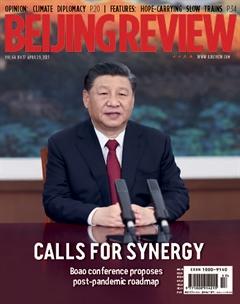SMART POWER
By Lu Yan

If technological breakthroughs can be made in the next 65 years at a speed comparable to that of the past 65 years, future technological development will be even faster, famed American cryptographer and scholar Whitfield Diffie said during a session on artificial intelligence (AI) at the Boao Forum for Asia (BFA) Annual Conference on April 19.
The term artificial intelligence was coined in 1956 by John McCarthy, a researcher who later went on to establish the AI labs at Massachusetts Institute of Technology and Stanford University.
“Sixty-five years have passed and now I believe we will face both opportunities and challenges in the coming five to 10 years,”said Max Yuan, Chairman of Shanghai Xiaoi Robot Technology Co. Ltd., at the session, adding that the technological dividends of the past 65 years will be fully released for the implementation of AI across various industries, including education and healthcare, so as to promote their development.
“However, all of our current technology systems and frameworks have not actually broken through the barriers of those systems formed in the past 60 years,” Yuan said. He believes that the technological bottleneck is not an issue faced by just one or two countries, but rather one that finds its roots in the entire AI system and at the core of AI technology development.
Yuan continued that todays AI is not a separate discipline or industry and requires many basic disciplines for support. Only when those disciplines and basic industries have developed to a certain stage, can AI lose the shackles of the past. “Technology was regarded as a tool during the first and second technological revolutions, but nowadays peoples expectations of AI far exceed the scope of a mere tool. That is a concern,” he said.
How can the public gain a better understanding of AI? Du Lan, Senior Vice President of Chinese AI heavyweight iFLYTEK Co. Ltd., said this should become a part of overall education.
Du suggested that AI be included as a universal course from elementary school, into middle school, all the way to university.
Wang Haifeng, CTO of Baidu Inc., believes that the best way to understand AI is through actual products. Forming habits to use products such as intelligent navigation systems and smart speakers can exert a subtle yet transformative influence. Wang also said the fostering of AI researchers and engineers, too, should feature high on the agenda.
5G is another technology that is expected to revolutionize the industrial landscape. By the end of 2020, China had achieved full 5G coverage in all cities above prefecture level. This year, the country will continue to greatly expand its 5G coverage across counties and towns.
Yang Jie, Chairman of China Mobile, the worlds largest telecom operator in terms of subscribers, said 5G could be applied “from heaven to Earth.”
China Mobile, Yangquan Coal Industry (Group) Co. Ltd. in Shanxi Province and other tech companies have launched a collaboration project, under which Xinyuan Mine of the Yangquan Co. installed 14 5G base stations at some 500 meters below sea level. This has further realized the monitoring of all underground workings and the real-time monitoring of harmful gases, ensuring efficient and safe proceedings.
“The input-output ratio remains very high. We have reduced the number of people by 20 for one borehole operation. This can help save tens of millions of yuan in total investment every year,” Yang said. BR
(Reporting from Boao, Hainan)

